Literature Examples
Example 1
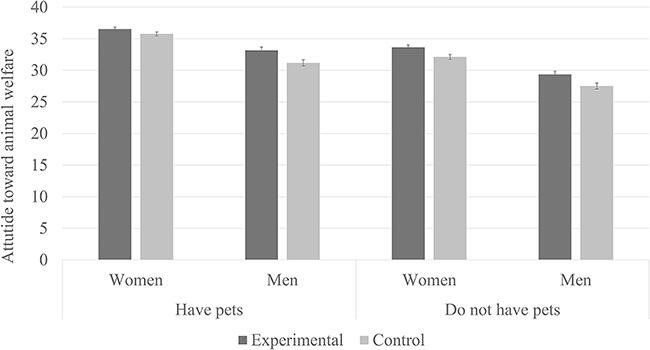
Caption
Figure 2.1 The influence of the experimental conditions on attitudes toward animal welfare.
Alt Text
Four measurements shown those who have pets generally have a higher value toward animal welfare than those who do not have pets, with women leading men.
Long Description
Measurements of attitude towards animal welfare, all values are approximations.
Those who have pets:
Women
Experimental is 36
Control is 35.5
Men
Experimental is 33.5
Control is 31
Do not have pets:
Women
Experimental is 34
Control is 33
Men
Experimental is 29.5
Control is 27
Source [Open Access]
Małecki, W., Sorokowski, P., Pawłowski, B., & Cieński, M. (2019). Human Minds and Animal Stories: How Narratives Make Us Care About Other Species (1st ed.). Routledge. https://doi.org/10.4324/9780429061424
Example 2
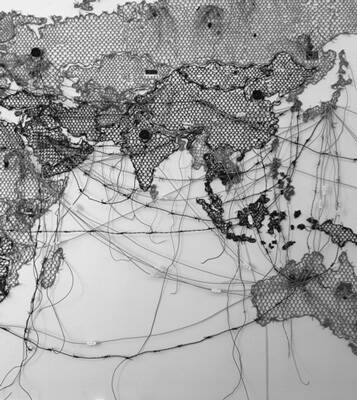
Caption
Figure 3.1 Reena Saini Kallat: Untitled Map Installation, 2011. Reena Saini Kallat, Mumbai, by permission.
Alt Text
Centered on the Indian Ocean a map made of netting with India and central Asia to the north, Africa to the west, Indonesia and Australia to the East; wires show lanes of travel across the ocean with many heading to the Suez Canal in the west from the eastern regions.
Source [Permission]
Reena Saini Kallat, Mumbai, by permission.
Example 3
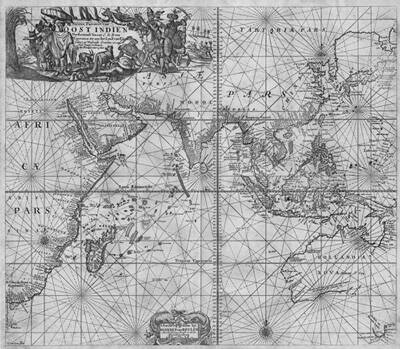
Caption
Figure 3.2 Oost Indien (East Indies), 1689. Johannes van Keulen, Amsterdam.
Alt Text
Disproportional map drawn centered in the Indian Ocean with a small India, labelled 'Nogol' surrounded by numerous island, an oversized Africa, labelled 'Africe Pars', fills the left of the map while Australia and the orient with oversized Indonesian islands on the right. A drawing fo people and cattle adorn the top left labelled 'Oost Indie'.
Source [Permission]
Johannes van Keulen, Amsterdam.
Example 4
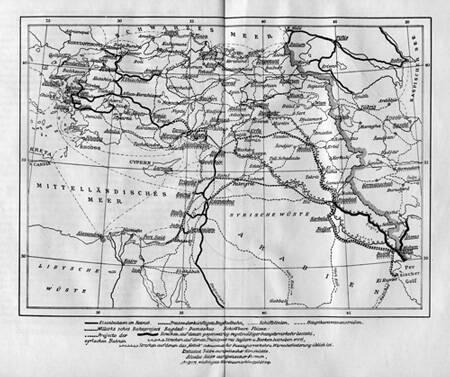
Caption
Figure 5.1 Map 1913.
Alt Text
Blurry map of the eastern Mediterranean with lines leading from a distorted image of Italy drawn as a plain peninsula without the boot-like shape, through the Adriatic countries across east-central europe and down the coast of modern day Israel, which is marked Syriacne Wüste, down to Egypt.
Source [Open Access]
Albrecht, M. (Ed.). (2019). Postcolonialism Cross-Examined: Multidirectional Perspectives on Imperial and Colonial Pasts and the Neocolonial Present (1st ed.). Routledge. https://doi.org/10.4324/9780367222543
Example 5
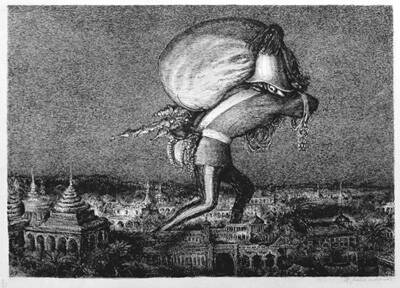
Caption
A. Paul Weber: The White Man's Burden (c) VG Bild-Kunst, Bonn 2018
Alt Text
An oversized 200 foot tall man wearing a 17th century British army uniform struggles under the weight of a large sack and numerous valuables on his belt and on his arms as he walks over an Indian city.
Source [Open Access]
Albrecht, M. (Ed.). (2019). Postcolonialism Cross-Examined: Multidirectional Perspectives on Imperial and Colonial Pasts and the Neocolonial Present (1st ed.). Routledge. https://doi.org/10.4324/9780367222543






